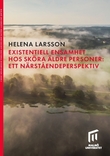Tyck till om SwePub Sök här!
onr:"swepub:oai:DiVA.org:hkr-21434"
Sökning: onr:"swepub:oai:DiVA.org:hkr-21434" > Existentiell ensamh...
- 1 av 1
- Föregående post
- Nästa post
- Till träfflistan
Existentiell ensamhet hos sköra äldre personer : ett närståendeperspektiv
-
- Larsson, Helena (författare)
- Malmö universitet,Högskolan Kristianstad,Avdelningen för sjuksköterskeutbildningarna och integrerad hälsovetenskap,Forskningsmiljön Människa - Hälsa - Samhälle (MHS),Malmö University,Institutionen för vårdvetenskap (VV)
- (creator_code:org_t)
- ISBN 9789178770618
- Malmö : Malmö universitet, 2020
- Svenska 164 s.
- Serie: Malmö University Health and Society Dissertations, 1653-5383 ; 2020:1
- Doktorsavhandling (övrigt vetenskapligt/konstnärligt)
Abstract
Ämnesord
Stäng
- The aim of this thesis was to explore existential loneliness from the perspective of significant others, to contrast their perceptions with frail older people’s experiences and to describe significant others’ and family care advisors’ views on existential support. This thesis is part of a larger research project about existential loneliness among frail older people, the LONE study. The thesis embraces three qualitative and one quantitative study. A total of 29 significant others, 15 frail older people and 120 family care advisors participated in the studies. The significant others were husbands, wives, daughters, sons, other relatives and friends to frail older people. The concept ‘frail older people’ was defined as older persons (≥ 75 years old) dependent on long-term health- or social care. The qualitative studies were based on multistage focus-group interviews (study I) and individual interviews (studies II and III). The quantitative study (IV) had a cross-sectional design and was based on a questionnaire specifically developed for the current study. Different methods to analyse data were used; hermeneutics (study I), content analysis (study II), a case study with thematic analysis (study III) and descriptive statistics (study IV). Findings from the four studies show that existential loneliness emerges when: 1) Longing for, but also striving for, a deeper feeling of connectedness, 2) Being in, but also enduring, an unwanted separation, and 3) Not finding, but still trying to recreate meaning. This thesis also shows that existential loneliness is often experienced in so-called limit situations in life and arises in difficult choices related to close relationships, in connection with experiences of meaninglessness and in the absence of connection to something or someone. The results show that existential loneliness emerges in the process of balancing between what was and what is to come in the unknown future. Significant others navigate themselves, and sometimes together with the older person, through an unfamiliar existence that makes them feel ambivalent about the de-cisions they have previously made and the decisions they need to make in the future, while also doubting the meaning in their current situation. Existential support should mainly focus on transition phases and on relational aspects. Person-centredness can be a way to make the existential needs of significant others and older people visible and to provide support based on their needs.
Ämnesord
- MEDICAL AND HEALTH SCIENCES -- Health Sciences -- Nursing (hsv//eng)
- MEDICIN OCH HÄLSOVETENSKAP -- Hälsovetenskaper -- Omvårdnad (hsv//swe)
- MEDICIN OCH HÄLSOVETENSKAP -- Hälsovetenskaper (hsv//swe)
- MEDICAL AND HEALTH SCIENCES -- Health Sciences (hsv//eng)
Nyckelord
- Existential loneliness
- frail older people
- significant others
- Existentiell ensamhet
- äldre personer
- närstående
- Frail older persons
- Significant others
Publikations- och innehållstyp
- vet (ämneskategori)
- dok (ämneskategori)
Hitta via bibliotek
- Existentiell ensamhet hos sköra äldre personer ett närståendeperspektiv (Sök publikationen i LIBRIS)
Till lärosätets databas
- 1 av 1
- Föregående post
- Nästa post
- Till träfflistan
Hitta mer i SwePub
- Av författaren/redakt...
- Larsson, Helena
- Om ämnet
-
- MEDICIN OCH HÄLSOVETENSKAP
- MEDICIN OCH HÄLS ...
- och Hälsovetenskaper
- och Omvårdnad
-
- MEDICIN OCH HÄLSOVETENSKAP
- MEDICIN OCH HÄLS ...
- och Hälsovetenskaper
- Delar i serien
- Malmö University ...
- Av lärosätet
- Högskolan Kristianstad
- Malmö universitet
Sök utanför SwePub
- Sök vidare i:
- Google Book Search
- Google Scholar
Kungliga biblioteket hanterar dina personuppgifter i enlighet med EU:s dataskyddsförordning (2018), GDPR. Läs mer om hur det funkar här.
Så här hanterar KB dina uppgifter vid användning av denna tjänst.
- Copyright © LIBRIS - Nationella bibliotekssystem
- LIBRIS.kb.se

